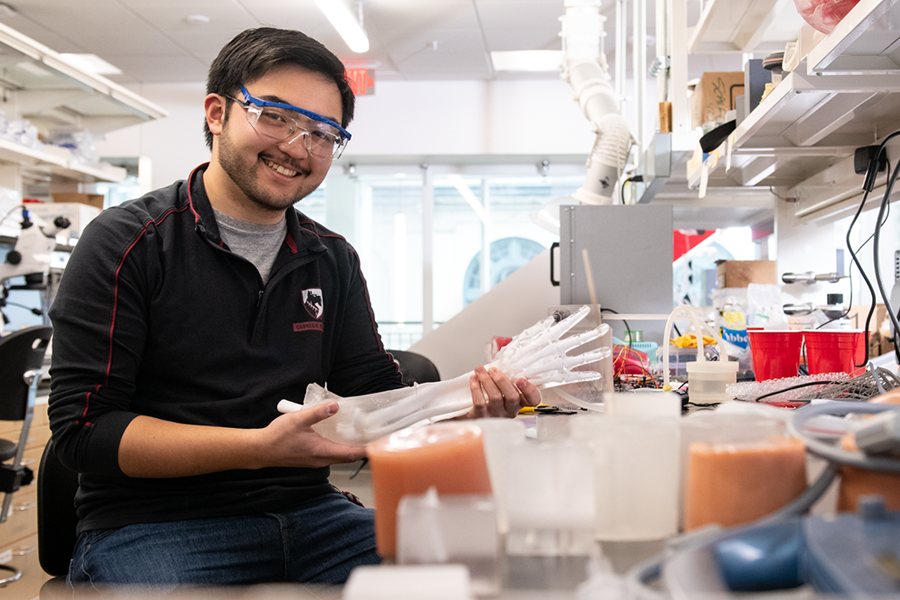Making innovation count
Sarah Burke
Apr 23, 2020

Source: Carnegie Mellon University
Sophomore Miguel Martinez is exploring lower cost, realistic models to help train surgeons.
In Professor Kenji Shimada’s Computational Engineering and Robotics Laboratory (CERLAB), Carnegie Mellon University sophomore Miguel Martinez is blazing new trails to build more cost-effective biomedical devices for surgical training.
A summer undergraduate research fellowship unlocked this powerful learning opportunity for Martinez, who is studying mechanical engineering and biomedical engineering.
“Surgeons use realistic models, called medical phantoms, of human body parts to practice surgical procedures, but they tend to be expensive to produce,” Martinez explains. “Our goal is to find a way to create these phantoms at a lower cost.”
Last year, 204 undergraduate research projects like Martinez’s received $436,315 in grants, summer fellowships and international fellowships through the Office of Undergraduate Research. Support from CMU donors helps make these awards possible.
Using 3D printing and casting techniques, Martinez is constructing artificial hands, complete with realistic joints and skin, to simulate orthopedic hand surgery. He says the new methods he’s developing could reduce production costs from thousands of dollars to less than $30 per phantom.
My experience as an undergraduate researcher has been incredibly rewarding and has played a big role in defining my career path.
Miguel Martinez, Mechanical engineering student, Carnegie Mellon University
“The thing I enjoy most about research has to be the sheer fact that I am making something,” Martinez says. “When nothing I’ve tried is working, I tell myself to back up and think about new directions to take. That feeling of satisfaction when things suddenly start to click outweighs any frustration from the challenges of research.”
Receiving a $3,500 summer fellowship from the Office of Undergraduate Research enabled Martinez to focus on his project full-time this summer.
In July 2019, he had the chance to sharpen his communication skills and present his research through CMU’s Speak Up! program, where he won both second place and the People’s Choice Award.
Martinez continued his research project for course credit this academic year.
His principal investigator, Professor Shimada, says he appreciates Martinez’s positive and proactive attitude in his lab.
“Once undergraduates find a research topic that matches their curiosity and passion, they get excited, work hard and learn a lot in a short period,” says Shimada, who is the Theodore Ahrens Professor of Engineering in the Department of Mechanical Engineering. “It is a joy to introduce these undergraduate students to new research areas that are not covered in the traditional curriculum.”
CMU supporters helped make all of this possible.
Miguel Martinez, Mechanical engineering student, Carnegie Mellon University
Professor Shimada says that tackling open-ended projects with faculty, post-doctoral researchers and graduate students helps undergraduates begin to think about their own careers.
“Undergraduate research is important because it can give students a preview of the ultimate goal of studying—contributing knowledge and impacting the world,” he says.
In the future, Martinez plans to attend graduate school and eventually work in either academia or industry. He says this research opportunity been an invaluable part of his education at CMU.
“My experience as an undergraduate researcher has been incredibly rewarding and has played a big role in defining my career path,” Martinez says. “CMU supporters helped make all of this possible.”
This story originally appeared as a feature on Carnegie Mellon University's Make Possible website.
Media contact:
Lisa Kulick
lkulick@andrew.cmu.edu